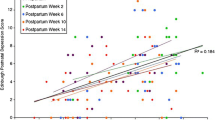Abstract
Few studies have examined relationships between perinatal depression and sleep in offspring beyond very early childhood. Eighty-five women classified as high risk for major depressive disorder during pregnancy completed measures of mood and their child’s sleep 4–7 years postpartum. Mothers with Beck Depression Inventory-II (BDI-II) scores ≥20 reported more sleep problems in their child, and child sleep disruption was a reasonable predictor of maternal BDI-II. More research is needed to determine causal relationships between perinatal depression and sleep in offspring.
Similar content being viewed by others
References
Achenbach TM, Rescorla L (2000) Manual for the ASEBA preschool forms and profiles: an integrated system of multi-informant assessment. Aseba, Burlington, VT
Armitage R, Flynn H, Hoffmann R, Vazquez D, Lopez J, Marcus S (2009) Early developmental changes in sleep in infants: the impact of maternal depression. Sleep 32:693–696
Beck AT, Steer RA, Brown GK (1996) BDI-II, Beck depression inventory: Manual. Psychological Corporation, San Antonio, TX
Dennis C, Ross L (2005) Relationships among infant sleep patterns, maternal fatigue, and development of depressive symptomatology. Birth 32:187–193
First MB, Spitzer RL, Gibbon M, Williams J (1996) Structured Clinical Interview for DSM-IV Axis I Disorders, Clinician Version (SCID-CV). American Psychiatric Press, Washington, D.C
Gavin NI, Gaynes BN, Lohr KN, Meltzer-Brody S, Gartlehner G, Swinson T (2005) Perinatal depression: a systematic review of prevalence and incidence. Obstet Gynecol 106:1071–1083
Goyal D, Gay C, Lee K (2009) Fragmented maternal sleep is more strongly correlated with depressive symptoms than infant temperament at three months postpartum. Arch Womens Ment Health 12:229–237
Hiscock H, Wake M (2001) Infant sleep problems and postnatal depression: a community-based study. Pediatrics 107:1317–1322
Meltzer LJ, Mindell JA (2007) Relationship between child sleep disturbances and maternal sleep, mood, and parenting stress: a pilot study. J Fam Psychol 21:67–73
O'Connor T, Caprariello P, Blackmore E, Gregory A, Glover V, Fleming P (2007) Prenatal mood disturbance predicts sleep problems in infancy and toddlerhood. Early Hum Dev 83:451–458
Owens J, Dalzell V (2005) Use of the 'BEARS' sleep screening tool in a pediatric residents' continuity clinic: a pilot study. Sleep Med 6:63–69
Radloff LS (1977) The CES-D scale: a self-report depression scale for research in the general population. Appl Psychol Meas 1:385–401
Author information
Authors and Affiliations
Corresponding author
Rights and permissions
About this article
Cite this article
Swanson, L.M., Flynn, H.A., Wilburn, K. et al. Maternal mood and sleep in children of women at risk for perinatal depression. Arch Womens Ment Health 13, 531–534 (2010). https://doi.org/10.1007/s00737-010-0177-z
Received:
Accepted:
Published:
Issue Date:
DOI: https://doi.org/10.1007/s00737-010-0177-z




